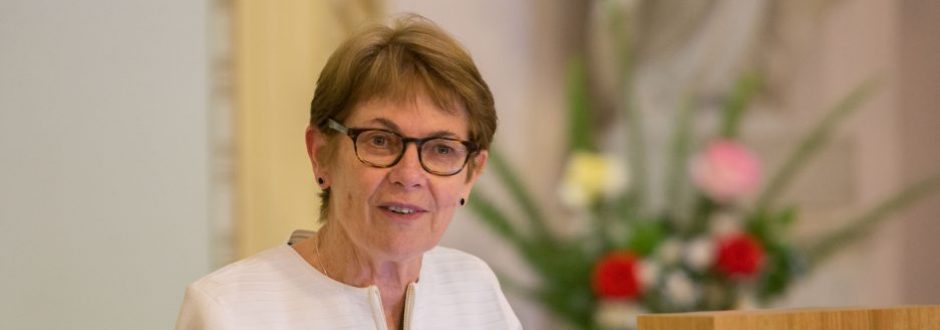In the spirit of Polding, may we pray for reconciliation between Indigenous and non-indigenous peoples and take action to address discrimination against any group of people, writes Sister Patty Fawkner.
Question: Have you noticed generally whether there has been a decrease of the aboriginal population?
Answer: I think there has been a very great decrease.
Question: To what cause do you attribute the decrease?
Thus goes the Q and A at a New South Wales Legislative Council Select Committee which was appointed “to consider the condition of the Aborigines, and the best means of promoting their welfare.”
This enquiry took place 175 years ago this month. John Bede Polding, Australia’s first Catholic Archbishop, was one of the white men (no Aborigines, no women) called to give evidence.
It occurs to me that the exchange between Polding and the parliamentarians on 10 September 1845 displays the best of humanity and exposes the worst of humanity in regard to race relations in this country, both then and now.
First, a word about Polding, a man ahead of his time and a misfit during his time. He was English and the Church he led was predominantly Irish. He was a Benedictine monk endeavouring to guide an undecidedly non-Benedictine diocesan clergy. He had a sensitive and refined spirit in a society where rawness and vulgarity thrived.
Loved by many, he was the cause of incredible frustration for others. His poor administrative skills were juxtaposed with his reputation of having “a good head, a better heart, and an overflowing zeal” – qualities which came to the fore during his testimony to the Select Committee.
In language memorable and poignant, Polding declares:
“I am making myself a black, putting myself in that position, and taking away all that I know except that this is my country, that my father lived by pursuing the emu, and the kangaroo, that I am driven away from my hunting grounds, that my children and tribe are subjected to the grossest barbarities.”
Then, in language cringingly suggestive of the social Darwinism that was to emerge later that century, Polding is asked:
“Do you not think you are assuming too much in supposing that they (the aborigines) could have such feelings?”
Polding stands in the footsteps of his Indigenous brothers and sisters and continues:
“The Aborigine will demand, ‘What right have you to come here? We have not asked you to come, and you take away our lands, you drive away our means of subsistence’.”
He makes a direct link with the parlous situation of the black community with the way in which the colonisers took possession of what was perceived as terra nullius:
“… occupation by force, accompanied by murders, ill-treatment, ravishment of their women, in a word, to the conviction on their minds that the white man has come for his own advantage, without any regard to their rights.”
A more egregious question follows:
“Looking to the aborigines, generally, as members of the great human family, what does your Lordship consider their position to be in the scale of humanity? Do you consider them the lowest in the scale or exceedingly low?”
Polding curtly responds:
“I do not understand the phrase ‘scale of humanity’ as it is generally used.”
Polding didn’t see grades or divisions of humanity, nor was he aware that he had befriended members of the longest surviving culture on the planet. He simply listened to the lament of Australia’s original inhabitants. He knew instinctively that ‘Black Lives Matter’ and lobbied authorities, his congregation, and all citizens that Aboriginal people be treated with dignity, respect and justice. He lobbied with love.
The racism that Polding identified continues to be a running sore in our national psyche. Those on the receiving end of racist remarks are dismissively counselled to ‘man up’. We make excuses for racist behaviour and deflect the conversation that needs to occur, perhaps understandably because it is easier, certainly more comfortable, to recognise racism in someone else rather than within our own psyche.
I see a parallel with what occurred in the early stages of revelations about the extent of sexual abuse within the Church. The initial defence was that this was the work of a few ’rotten apples’. Yet statistics indicate that racism is systemic, structural and institutionalised.
Statistics abound. For example, the national imprisonment rate for Aboriginal and Torres Strait Islander adults is 15 times higher than that for non-Indigenous adults. Four hundred Indigenous people have died in custody since 1991 and, to date, not one person has been convicted of these deaths. Statistic upon statistic.
The Uluru Statement From The Heart, in language which, like Polding’s is both memorable and poignant, puts flesh and blood on the statistics:
Proportionally, we are the most incarcerated people on the planet. We are not an innately criminal people. Our children are aliened from their families at unprecedented rates. This cannot be because we have no love for them. And our youth languish in detention in obscene numbers. They should be our hope for the future.
The authors of the statement speak on their own behalf and do not need an intermediary such as Polding. They display a graciousness, and a commitment to mutuality and co-responsibility to work with the government and all Australians. “We invite you to walk with us in a movement of the Australian people for a better future.”
Polding would have been the first to respond positively to such an invitation.
